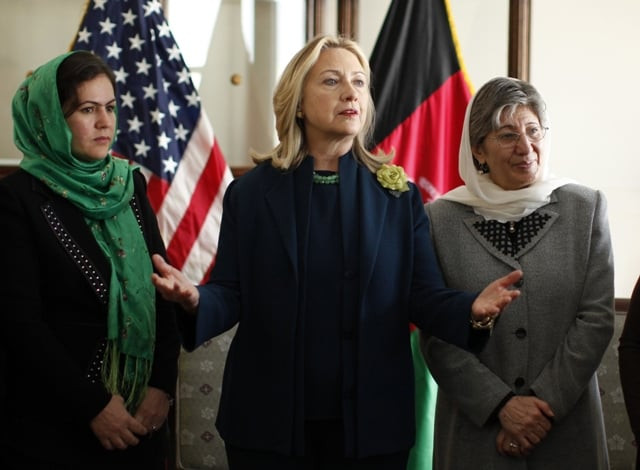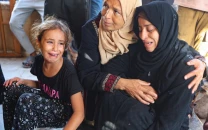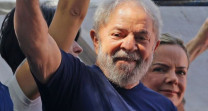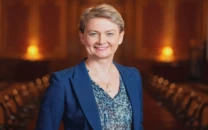Hillary Clinton seeks political exit to Afghan war
Top US diplomat expected to meet President Hamid Karzai for talks before lunch.

The top US diplomat was expected to meet President Hamid Karzai for talks before lunch, as she seeks to build on the "diplomatic surge" she announced earlier this year, a senior state department official told travelling media.
Ten years after the US-led invasion, Karzai's reconciliation efforts were derailed by the September assassination of peace broker Burhanuddin Rabbani and the Taliban are perceived to pose an increasingly wide threat in Afghanistan.
Concern is also growing among Afghans about the prospect of a return to civil strife after 2014, when the US-led NATO mission is scheduled to withdraw combat troops and hand over responsibility to Afghan security forces.
"She will want to emphasise that the United States remains committed to Afghan reconciliation," a senior US official said, particularly in the wake of the September 20 assassination of Rabbani, a former president of Afghanistan.
Rabbani headed a government council seeking a political settlement with the insurgents. A powerful Tajik, he was a leader in the Northern Alliance that fought the former Taliban regime and assisted US troops in the 2001 invasion.
Before seeing Karzai, Clinton met civil society leaders in the capital, including Rabbani's son Salahuddin Rabbani, who now heads his father's political party, Jamiat-e-Islami.
A conference of regional powers to be held in Istanbul in early November, and an international meeting of foreign ministers in Bonn, Germany, in early December, would be part of discussions.
"She'll want to talk to President Karzai about the importance of Afghanistan being linked to the region... so she'll want to talk about our diplomatic efforts coming up in Istanbul," said the senior official.
After 10 years of military conflict in Afghanistan that has cost thousands of lives and hundreds of billions of dollars, Washington is grappling for a negotiated exit to the war ahead of the 2012 US presidential elections.
Tentative discussions with the Taliban aimed at full peace talks have so far come to nothing, officials acknowledge, and Western powers have been attempting to draw in the help of Afghanistan's neighbours, with little success so far.
Many Afghans hold Pakistan responsible for the war's long course, given that senior Taliban and al Qaeda-linked militants have strongholds along the restive border that separates the two countries.
Clinton is due in Pakistan after her talks in Kabul, where she is expected to step up pressure on Islamabad to take action against Taliban havens.
Nevertheless, the United States needs to tread a careful line, knowing that the nuclear-armed nation will be a key stakeholder in any eventual political settlement in Afghanistan.
"(Clinton) agrees with President Karzai that Pakistani cooperation is critical on the issues in Afghanistan, so she'll consult with him," the senior official added.
(Read: US supports India's 'constructive' role in Afghanistan)
Nearly two years ago, the United States sent an extra 33,000 troops into Afghanistan in a bid to break the back of the Taliban insurgency.
Despite touted successes in the Taliban heartland in the south, violence has spread to previously peaceful parts in the west and north, and the perception of security in Kabul has deteriorated after some high-profile attacks there.
The first tranche of those troops returned home this summer, while the remaining 23,000 troops are set to return by the end of summer 2012, with all NATO-led combat forces scheduled to leave by the end of 2014.
There are currently 98,000 US troops out of a total NATO-led force of 130,000 deployed to Afghanistan, fighting an insurgency that remains virulent across the country, with the war now focused on the eastern border with Pakistan.
But experts doubt the ability of the Afghan army and police to fight the Taliban alone, and US officials and officers have suggested that a smaller US military contingent could remain beyond the 2014 deadline in a combat role.
Long-term strategic arrangements between the two countries would also be discussed during Clinton's visit, the senior official said.



















COMMENTS
Comments are moderated and generally will be posted if they are on-topic and not abusive.
For more information, please see our Comments FAQ